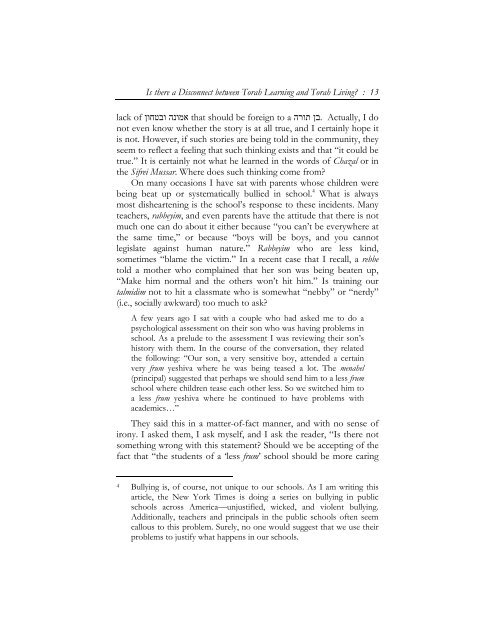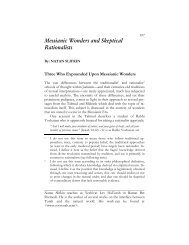Is There a Disconnect between Torah Learning and ... - Hakirah.org
Is There a Disconnect between Torah Learning and ... - Hakirah.org
Is There a Disconnect between Torah Learning and ... - Hakirah.org
Create successful ePaper yourself
Turn your PDF publications into a flip-book with our unique Google optimized e-Paper software.
<strong>Is</strong> there a <strong>Disconnect</strong> <strong>between</strong> <strong>Torah</strong> <strong>Learning</strong> <strong>and</strong> <strong>Torah</strong> Living? : 13<br />
lack of אמונה ובטחון that should be foreign to a תורה .בן Actually, I do<br />
not even know whether the story is at all true, <strong>and</strong> I certainly hope it<br />
is not. However, if such stories are being told in the community, they<br />
seem to reflect a feeling that such thinking exists <strong>and</strong> that “it could be<br />
true.” It is certainly not what he learned in the words of Chazal or in<br />
the Sifrei Mussar. Where does such thinking come from?<br />
On many occasions I have sat with parents whose children were<br />
being beat up or systematically bullied in school. 4 What is always<br />
most disheartening is the school’s response to these incidents. Many<br />
teachers, rabbeyim, <strong>and</strong> even parents have the attitude that there is not<br />
much one can do about it either because “you can’t be everywhere at<br />
the same time,” or because “boys will be boys, <strong>and</strong> you cannot<br />
legislate against human nature.” Rabbeyim who are less kind,<br />
sometimes “blame the victim.” In a recent case that I recall, a rebbe<br />
told a mother who complained that her son was being beaten up,<br />
“Make him normal <strong>and</strong> the others won’t hit him.” <strong>Is</strong> training our<br />
talmidim not to hit a classmate who is somewhat “nebby” or “nerdy”<br />
(i.e., socially awkward) too much to ask?<br />
A few years ago I sat with a couple who had asked me to do a<br />
psychological assessment on their son who was having problems in<br />
school. As a prelude to the assessment I was reviewing their son’s<br />
history with them. In the course of the conversation, they related<br />
the following: “Our son, a very sensitive boy, attended a certain<br />
very frum yeshiva where he was being teased a lot. The menahel<br />
(principal) suggested that perhaps we should send him to a less frum<br />
school where children tease each other less. So we switched him to<br />
a less frum yeshiva where he continued to have problems with<br />
academics…”<br />
They said this in a matter-of-fact manner, <strong>and</strong> with no sense of<br />
irony. I asked them, I ask myself, <strong>and</strong> I ask the reader, “<strong>Is</strong> there not<br />
something wrong with this statement? Should we be accepting of the<br />
fact that “the students of a ‘less frum’ school should be more caring<br />
4 Bullying is, of course, not unique to our schools. As I am writing this<br />
article, the New York Times is doing a series on bullying in public<br />
schools across America—unjustified, wicked, <strong>and</strong> violent bullying.<br />
Additionally, teachers <strong>and</strong> principals in the public schools often seem<br />
callous to this problem. Surely, no one would suggest that we use their<br />
problems to justify what happens in our schools.
















